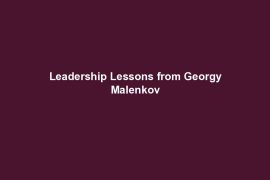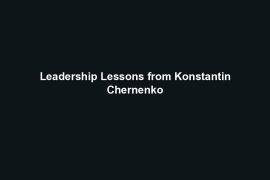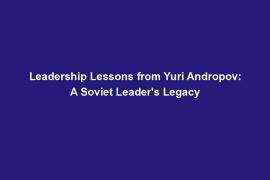Hey there, folks! Today, we’re diving into the intriguing world of leadership with a closer look at one of the most influential figures in global politics: Vladimir Putin. Love him or hate him, there’s no denying the impact Putin has had on shaping the political landscape of not just Russia, but the entire world.
So, what exactly can we learn from Putin’s leadership style? Well, that’s what we’re here to explore. From his iron grip on power to his strategic maneuvers on the world stage, there’s a lot to unpack when it comes to the lessons we can glean from this enigmatic leader.
In this blog post, we’re going to dissect Putin’s leadership approach, focusing on three key areas: power, strategy, and influence. We’ll take a closer look at how Putin has managed to consolidate power in Russia, the risks of centralizing power in one leader, and how his strategic thinking has shaped his interactions with other world leaders.
So buckle up and get ready to delve into the complex world of leadership with our guide to the lessons we can learn from Vladimir Putin. It’s going to be a wild ride!
Power: The Foundation of Putin’s Leadership
When it comes to leadership, power is often seen as the ultimate currency. And Vladimir Putin has certainly mastered the art of wielding power in the political arena. From his early days in the KGB to his rise to the presidency of Russia, Putin has consistently focused on consolidating power and maintaining control over the country.
One of the key ways that Putin has done this is through political reforms that have allowed him to centralize power in the hands of the president. By weakening the power of other branches of government and stifling dissent through tactics such as media censorship and political repression, Putin has ensured that he remains the most powerful figure in Russia.
But while this consolidation of power has helped Putin maintain stability and control in Russia, it also raises important questions about the dangers of concentrating too much power in the hands of a single leader. When a leader has too much power, it can lead to abuses of that power, violations of human rights, and a lack of checks and balances that are essential in a democratic society.
Strategy and Influence: Putin’s Political Chess Game
Putin’s leadership style is characterized by a strategic approach to international relations and diplomacy. He is known for playing the long game, carefully planning his moves to achieve his political goals and strengthen Russia’s position on the global stage. Whether it’s annexing Crimea, supporting separatist movements in Eastern Europe, or intervening in conflicts in the Middle East, Putin has shown a willingness to use influence and manipulation to further Russia’s interests.
But while Putin’s strategic prowess has undoubtedly helped him achieve his political objectives, it also raises concerns about the implications of his leadership tactics for other world leaders and the global political landscape. By engaging in aggressive and sometimes destabilizing actions, Putin has set a precedent that could embolden other leaders to pursue similar tactics, leading to increased tensions and conflicts on the world stage.
As we examine Putin’s leadership lessons in power, strategy, and influence, it’s important to consider the ethical considerations of applying these lessons in our own leadership journeys. While power and influence can be effective tools for achieving our goals, we must also be mindful of the impact our actions have on others and the world at large. By reflecting on Putin’s leadership style, we can gain valuable insights into the complexities of leadership and the importance of using power responsibly.
Strategy and Influence
Now that we’ve delved into Vladimir Putin’s consolidation of power, let’s shift our focus to his strategic approach in international relations and diplomacy. Putin is known for his shrewd tactics and calculated maneuvers on the world stage, which has earned him both admirers and critics.
One of Putin’s key strengths lies in his ability to use influence and manipulation to achieve his political goals. Whether it’s through strategic alliances, economic incentives, or covert operations, Putin has shown a mastery of soft power tactics that have allowed him to expand Russia’s influence globally.
Take, for example, Russia’s intervention in Syria. By backing President Bashar al-Assad’s regime, Putin not only secured Russia’s military interests in the region but also positioned himself as a key player in Middle Eastern affairs. This move showcased Putin’s strategic thinking and his willingness to use force and coercion to achieve his objectives.
Implications for Leaders
So, what can other world leaders learn from Putin’s leadership tactics? While it’s essential to be strategic and assert influence in international relations, there are ethical considerations to keep in mind. Leaders must navigate the fine line between using power for good versus manipulating situations for personal gain.
Putin’s approach to leadership serves as a cautionary tale for those in positions of power. It’s a reminder that unchecked authority can lead to abuses of power and undermine democratic principles. As we analyze Putin’s strategies, let’s also reflect on how we can apply these lessons in a responsible and ethical manner in our own leadership roles.
As we continue to observe Putin’s reign and its impact on global politics, it’s crucial to think critically about the implications of leadership styles on society and the world at large. By studying the successes and shortcomings of leaders like Putin, we can gain valuable insights that will shape our own leadership journeys and contribute to a more just and equitable world.



